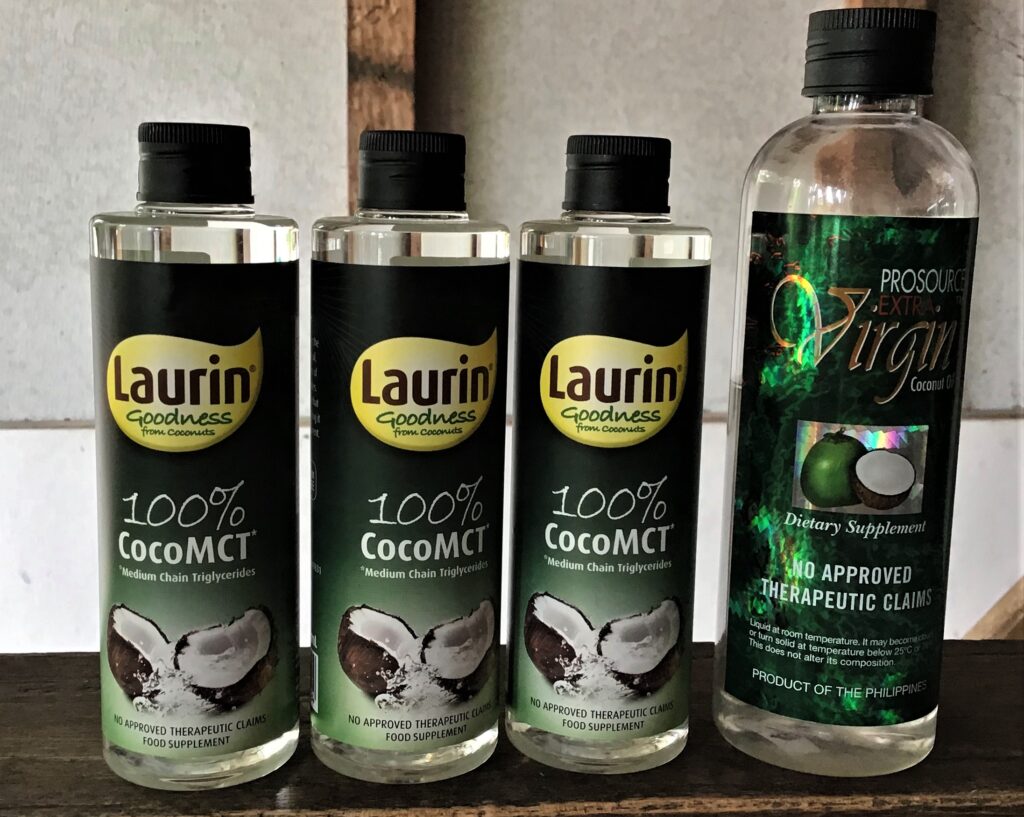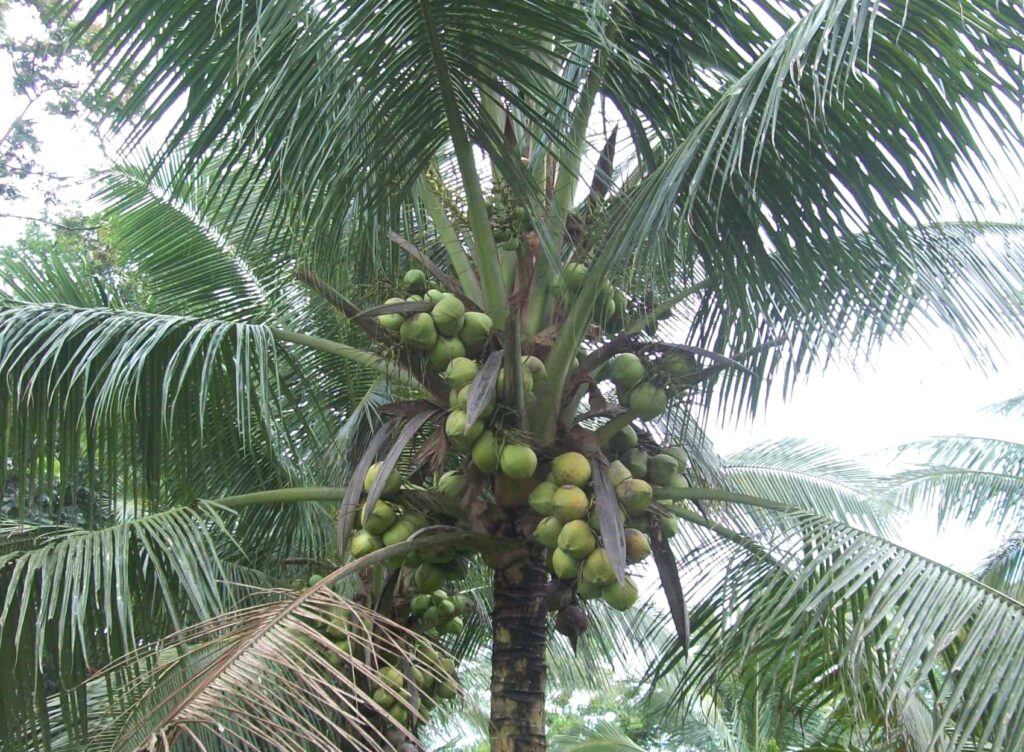Text and Photos by Henrylito D. Tacio
To explore the possible use of virgin coconut oil (VCO) as adjunctive therapy for hospitalized patients with coronavirus disease 2019 (COVID-19), the Department of Science and Technology (DOST) is investing about P8.4-million.
Adjunctive therapy is any therapeutic maneuver therapy ancillary to the care needed a short term to stabilize a patient, but which reduces the morbidity and mortality long term.
More than half of the money – about P4.8 million – will be used by the Philippine General Hospital for 74 eligible patients who will participate in a study that will monitor the safety of VCO.
“The patients will be randomly assigned either to a standard care or treatment group,” the press statement explained. “The treatment group will receive 15 milliliters or about one tablespoon of VCO every meal, three times a day on top of standard regular care for two weeks.”
During this period, the patients’ lipid profile, fasting blood sugar, creatinine, and efficacy of VCO through recovery from symptoms and virus clearance will be closely monitored. Dr. Marissa M. Alejandria of the University of the Philippines Manila supervises this project.
“Results from this study will prove the efficacy of VCO in helping improve the overall health status and recovery of a COVID-19 patient,” the press statement explained.
Another project – costing P3.6 million will be handled by the Food and Nutrition Research Institute, a line agency of the DOST. The VCO is given to suspect and probable cases of COVID-19 who are quarantined in a center or hospital, so the cases will not be severe.
Tapped to led this project is FNRI Director Dr. Imelda Angeles-Agdeppa. It aims to evaluate VCO’s beneficial effects in terms of CRP level, all hematology tests (CBC differential count), pulmonary function, viral load or CD4+, lipid profile, diminishing/resolution of signs and symptoms, and the number of days in the center.
CRP refers to C-Reactive Protein. An elevated CRP level means there is inflammation somewhere in the body.
“If the results of this study prove to be successful, VCO can be used as a potential supplement of suspect and probable cases of COVID-19 to prevent the worsening of the condition of the patient,” the press statement said.
The VCO used in the study was analyzed by the Laboratory Services Division of the Philippine Coconut Authority (PCA). DOST funding on VCO studies was released through its Philippine Council for Health Research and Development.

Some commercial VCO 
Coconut tree
“There are still alternative solutions against COVID-19 aside from vaccines,” said Science Secretary Fortunato de la Peña in a statement. “Although further investigation is needed before we develop a possible prevention or treatment option, we aim to give Filipinos hope through our ongoing local research initiatives.”
Coconut oil is most potent when it’s virgin. “VCO is a natural oil from the fresh, mature kernel of the coconut,” explains the book, Compendium of Commercially-Viable Coconut Technologies, published by Philippine Council for Agriculture, Aquatic and Natural Resources Research and Development (PCAARRD).
“VCO is the purest form of coconut oil, water white in color and has not undergone oxidation,” the PCA said. “It is the oil obtained from the fresh and mature kernel of coconut by mechanical or natural means with or without the use of heat, without undergoing chemical refining, bleaching or deodorizing, and which does not lead to the alteration of the nature of the oil.”
The late National Scientist Dr. Conrado S. Dayrit was touted to be the Father of VCO. His book, The Truth About Coconut Oil, published in 2005, became a bestseller and elevated coconut oil from folk medicine to a scientific therapy. He was a cardiologist and professor of pharmacology at the University of the Philippines College of Medicine.
“Today, people are returning to natural diets in order to live healthier and happier lives – the hallmarks of ‘wellness’ – and science has been validating the benefits,” Dayrit wrote in the prologue of Coconut Oil: From Diet to Therapy which he co-authored with his son, Fabian.
So, what’s in the VCO that makes it a candidate as adjunctive therapy for COVID-19? VCO reportedly contains lauric acid and monolaurin. Past studies suggest that these chemical compounds can stop the replication of the COVID-19 virus and the binding of the proteins of the virus to the cell membrane of the host.
These chemical properties of VCO are now being used against COVID-19 through adjunctive therapy.
Dr. Fabian M. Dayrit of the Ateneo de Manila University is one of the advocates of using VCO in treating COVID-19. An academician of the DOST-National Academy of Science and Technology, he is also involved in the DOST-FNRI study.
“If proven as an effective adjunctive therapy, VCO can boost the coconut industry in the Philippines,” said the press statement. “Then, if the VCO will indeed be successful in addressing COVID-19, the market for VCO will increase because it will also become affordable and easily accessible to consumers.”
The Philippines is the second-largest coconut-producing country in the world, after Indonesia. It has introduced VCO to the world in 2000-2001 and remains to be the world’s number one VCO exporter. In 2015, VCO was exported to 46 countries, the United Coconut Association of the Philippines said.
The top importers were the United States, the Netherlands, Canada, Germany, and Japan. Other destinations were Belgium, the United Kingdom, South Korea, and Australia. Smaller volumes went to Malaysia, Brazil, Taiwan, South Africa, France, China, Singapore, and Czechoslovakia.
The main distinction between regular and virgin coconut oil lies in the making and extraction. VCO is extracted from coconut milk taken from fresh coconuts. “Then, it undergoes several processes like fermentation, churning (centrifugal separation), refrigeration and the enzyme actions after this oil is parted from moisture,” explains netmeds.com.
The raw material and process of extraction of VCO do not allow any usage of heat. Sometimes, VCO is made directly by cold compression of fresh, dried coconut meal called micro expelling.
A 2009 study published in the International Journal of Food Sciences and Nutrition confirmed that VCO had better antioxidants than refined, bleached, and deodorized coconut oil.

